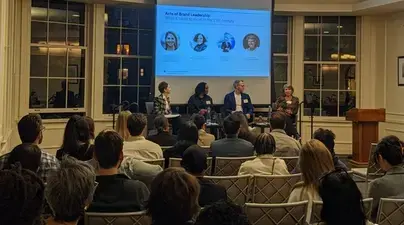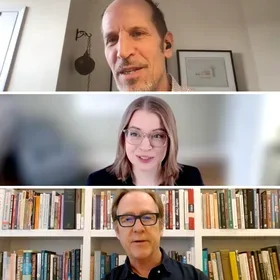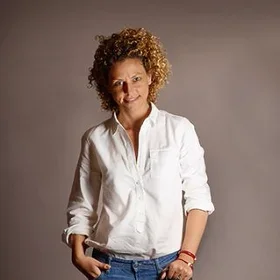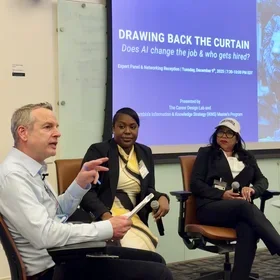By Jaideep Salil
On October 14, Google brand strategists spoke with faculty and students in the Columbia SPS MS in Strategic Communication program about corporate social responsibility: the challenges associated with maintaining a consolidated image and Google’s human-centric approach to branding. The event, Acts of Brand Leadership, was the latest installment in the program’s Strategic Communication Speaker Series.
The panel:
- Enshalla Anderson, director, global head of brand & creative, Google Cloud
- Susan Betts, director of brand strategy and management, Google
- Dominik Prinz-Barley, head of brand strategy, Google
- Kristen Campolattaro (moderator), chief marketing officer, Eloquii; lecturer, Columbia University MS in Strategic Communication program
Here is what each panelist had to say broadly:
Purpose-Driven Branding
Dominik: The history of branding can be broken down into five distinct periods: the age of identity, age of value, age of experience, age of you, and age of influence. We are currently in the age of meaning, where people are looking toward brands to help them realize their values and navigate big social issues. Successful brands today must seek to improve the lives of people and create value for society. The mentality that the business of business is to do only business is no longer applicable!
Enshalla: With the rise of social media, brands today are expected to move at the speed of culture. Broadcasting your message is not enough. As Dom alluded to earlier, we are very much in an age of one-on-one branding, where brands are expected to engage in a dialogue with people over big cultural and social issues. Complicating matters is the pace and velocity at which these conversations must take place. Engagement must also come from a place of authenticity. This is why showing up at the speed of culture is vital to staying relevant and communicating effectively.
Susan: There’s a rational and emotional component to brand at Google. Initially, we were a company of one product: search. Now we are a company of a hundred different products. Communicating Google’s story is a much harder task today than it was back then. However, the thread that runs through all of our products is the promise of an emotional connection. Everyone in this room has used Google’s services in some form or another today. Not just once, but multiple times in a day. It is an intimate and direct connection. Continuously delivering on people’s expectations helps build trust and belief in our work, ultimately paving the way for a long-standing relationship. At the end of the day, our products speak louder than any of our marketing efforts.
Being an Anchor in an Age of Disruption
Susan: Today we find ourselves in a poly-crisis mode. We’re just coming out of a pandemic, there is a war going on, and the threat posed by climate change is intensifying. People are losing faith in government and other traditional institutions. There is a crisis of trust. In such times, people look to large organizations, such as Google, for support and direction. We have helped businesses keep open during the pandemic, connected families during the height of physical distancing, and provided voters with reliable election information. We strive to be there for people when they need it the most. Otherwise what’s the use of being one of the largest companies if you are not good for your neighbors?
Dominik: When I first started at Google, I dug into the archives of the company to better understand its soul. In one of the founding letters written by Sergey and Larry, the fundamental aim of Google is described as improving the lives of people.People at Google actively go about their jobs looking at barriers in culture and society that hinder a person’s ability to achieve the best version of themselves. Barriers like access to technology, poor literacy, and access to healthcare. There is a genuine desire to find and fix these problems through technological interventions. This is why we rank so highly on trust with customers.
Enshalla: As touched upon earlier, our size allows us to exert an impact that makes a material difference in people’s lives. In the pursuit of helping improve people’s lives, we reach so broadly, across so many different segments and types of customers, that we become a sort of confidant, assisting individuals in making sense of the world around them. Our technological offerings and the scale at which we operationalize them help us move society forward.
Challenges Associated with Scale
Enshalla: Google has more than 150,000 employees worldwide. Each of them with their personal reasons to join the organization. To ensure that every employee understands what Google’s about, a lot of effort is put into internal branding. This is important because when employees reflect their organization’s core culture and values, they resonate that externally. I feel this is very much the case at Google, where people will always make time to help you.
There is room for improvement though. As an organization of many different business units, it is important to cultivate the sense that we are all connected. This is more easily achievable if we address brand management as a team and not as individuals.
Dom: I think authenticity is important for every brand. A big part of being authentic is to allow yourself to be vulnerable and admit when you don’t get things right. The challenge for a lot of big organizations is balancing that desire to always be perfect, with letting your guard down enough to let people in and engage with them in a real and thoughtful manner.
Susan: We’ve been on this journey of taking a very hard look at our marketing work. As a large organization with a voice on the world stage, we have a responsibility to have a positive influence in society. To that end, we have asked ourselves how inclusive are we in our marketing? Are we representing the world in all its diversity? Practicing this reflexivity across all our products in a decentralized organizational setting is challenging. How do we keep brand messaging intact, while giving businesses leeway to do what they want?
Applications are open for fall 2023 enrollment in the Executive M.S. and part-time and full-time M.S. in Strategic Communication program at Columbia. Learn more about the program.



